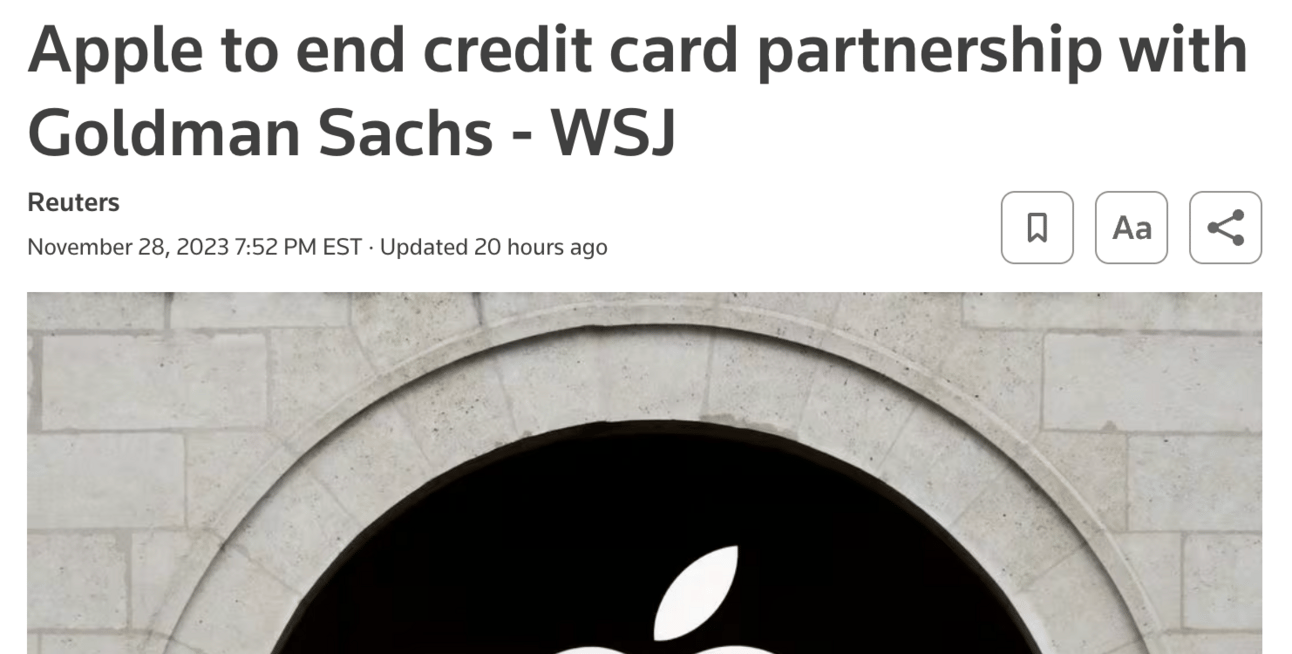- MoneyBytes Weekly
- Posts
- Goldman bites the Apple 🍎
Goldman bites the Apple 🍎
...and Paradigm puts Blast on blast?
Hey, Gavin here with your weekly recap of all things internet & money. This week in fintech:
🍎 The Apple / Goldman partnership is over
⚡️ Paradigm blasts their own portfolio company
🐅 Stripe wins Black Friday …
….and more!
Did someone forward you this newsletter? Subscribe here to get MoneyBytes 1x weekly!
STORIES OF THE WEEK
1) Goldman bites the Apple 🍎

Apple and Goldman Sachs appear to be calling it quits on their credit card partnership. We wrote about this back in October, as rumors surfaced that Goldman was looking for a way to get out of the deal amid broader challenges in their consumer lending business.
The WSJ reported this week that Apple was indeed pulling the ripcord on its credit card partnership with Goldman, “sending a proposal to the Wall Street bank to exit the contract in the next 12 to 15 months.” This termination of the partnership includes the Apple Card, as well as the savings account that was unveiled earlier this year. There are rumors that Goldman may offload its portion of the partnership—launched to much fanfare in 2019—to American Express.
📊 Digits: $350, the amount Goldman allegedly spends for every new Apple Card user
💬 Words: "The Apple Card was one of the best fintech launches ever" — Sheel Mohnot
What it means →
Some of the press this has received so far makes it seem like Apple is the loser here. Case in point:

But this kind of misses the broader reality: consumer banking has not gone swimmingly for Goldman. The bank took a hit with their acquisition (and subsequent sale) of consumer lending company Greensky, and absorbed substantial losses from the Apple partnership as well.
But the partnership has by all accounts been a success…for Apple! It was one of the most touted fintech launches ever (Steve Jobs had proposed an Apple Card as early as 2004). It’s a consumer hit, winning multiple customer satisfaction awards for co-branded cards.
Goldman is the one that hasn’t been able to make it work. Competition for the Apple partnership was hot, and it’s pretty clear now that Goldman won a deal that didn’t have the upside they thought it would have. As Alex Johnson noted, Apple will find a new partner (maybe Amex), and the Apple Card will continue to be a thing. And Goldman is going to have to pay up to exit the deal years early.
Beyond the misleading headlines, the lesson might be one of hubris in consumer banking. Like the parable of the apple tree, Goldman wasn’t content with its lot in life. It looked up at the night sky (the market) and saw beautiful stars (flashy consumer banking $$). But we all have special gifts, and maybe consumer banking isn’t where Goldman is going to find happiness.
2) Paradigm blasts Blast ⚡️

Paradigm, a heavyweight in the crypto VC world, found itself in the hot seat over its investment in Blast. The platform, led by Blur founder Tieshun Roquerre, has been scrutinized for its launch strategy, which promised exponential yield growth and rewards for network invites. This approach drew skepticism from parts of the community, with some labeling it Ponzi-like.
Blast is an Ethereum layer-2 (L2) network focused on offering native yield for Ethereum and stablecoins. In other words, users can stake their funds and earn interest on them. Users have already transferred over $500M in assets to the platform, just a week after launching deposits.
Critics have raised concerns, including ownership and safety of funds. Polygon dev Jarrod Watts pointed out that ownership of the contract is held in a multi-signature contract. This ‘multisig’ approach is pretty standard, but the wallets that control the contract are all fairly new. In short: 3 unknown wallets control half a billion in user funds.
Paradigm’s Dan Robinson stepped up to express the fund's concerns, stating that the launch had "crossed lines", but didn’t go much further than that.
📊 Digits: Users have already locked $535 million in funds on Blast, just a week after launch
💬 Words: "We don’t endorse these kinds of tactics." — Dan Robinson, Paradigm
What it means →
This is a story that hasn’t gotten much play outside of crypto publications, but it’s an interesting one. First, it’s not often that you see VCs step out and publicly break with portfolio companies over strategy. But in the wake of a series of crypto debacles like FTX, where Paradigm, Sequoia and others had substantial egg on their faces—and given the role crypto VCs play in the ecosystem in legitimizing projects and even advising on technical architecture—Paradigm's reaction makes more sense.
By all accounts, there seem to be some interesting and exciting elements to Blast. But the criticisms are real: namely that they started accepting funds from users and staked them to other protocols like LIDO before any bridge, any testnet, or any transaction data being sent to Ethereum. In short, Blast wants to be an L2, but right now it doesn’t have any of the components of being an L2. The post by Dan at Paradigm seems to focus mainly on that fact: Paradigm doesn’t want to defend the fact that they launched the bridge before the full L2.
Post-FTX, crypto VCs aren't just viewed as financial backers; they are increasingly seen as gatekeepers and responsible stewards for the ecosystem. When a VC is called to testify at the trial of one of their portfolio company founders, it is a big deal. That happened to Paradigm with FTX, and that isn’t the first (or last) time it is likely to happen to a crypto VC. With regulators tightening the noose around non-compliant crypto projects, investors are going to be more vocal about reputational risks.
Byte-sized nuggets
⚫️ BFCM is a BFD. This year, Stripe launched a live dashboard of all their Black Friday / Cyber Monday payments volume. They processed a whopping 303 million transactions, $18.6 million in volume, and over 31,000 businesses had their best sales day ever on Stripe.
🏛️ Crypto legislation soon? Politico has a new story on Rep. Patrick McHenry, who is fighting to advance crypto legislation in the face of stiff opposition from Sherrod Brown and others.
🤥 You down with OCC? The Office of the Comptroller of the Currency (OCC’s) first ever fintech head allegedly fabricated most of his resume. Best of all, he claimed to have worked at Citi in 1994, when he was just 13 years old. Unsurprisingly, he’s no longer at the OCC.
🔶 Bye-nance. Blockchain analytics firm Nansen reported that over $1b flowed out of the crypto exchange following news that CZ would step down and Binance would pay a massive fine. FUD or not, things could continue to get worse for CZ, as he may face up to 10 years in prison.
💵 Webullish on Webull. Webull jumped into the Mexico market by acquiring stock trading app Flink. Flink had raised some $70m from backers like Accel and Lightspeed.
3️⃣0️⃣ Below. The Forbes 30 under 30 Finance list dropped this week, leading to an incredible outpouring of fraud jokes on Twitter.
Callout Corner
Got something you want featured next week? Amazing post, underrated tweet, mega milestone? Hit reply and let us know.
What is the best fintech partnership of the last 15 years? Gotta be Stripe-Shopify right?
Other candidates?
— Scott Wessman (@scottew)
1:57 PM • Nov 28, 2023
Byte of Bliss
Head of the ECB, Christine Lagarde, on her son losing all his money on Crypto:
“He ignored me royally, which is his privilege,” Lagarde told a town hall with students in Frankfurt. “And he lost almost all the money that he had invested.”
— Gavin